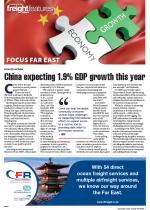2020 has been a year of upheaval. No more annual trends but an uncertain “new normal”.According to Michelle Horner, trade lane manager at CFR Freight, this is also true of the Far East market.“China remains the dominant exporter of goods into South Africa, but we are seeing some changes in the market. South African importers are increasingly sourcing goods from alternative countries in the East,” she said. “Countries like Vietnam, Korea, Indonesia and India are gaining prominence.”Horner told Freight News it had been critical for CFR Freight and its Far East partners to ensure they had the f lexibility to develop their LCL services from the region to cater for the increasing demand for direct import services from these alternate countries. “We currently offer 30 direct LCL services from the region into South Africa. These services are aimed at ensuring reliable efficiencies to suit the needs and requirements of our clients.”She said 2020 had upended annual trends. The demand from the Far East was, however, steadily increasing month on month. “Change in global trade has resulted in equipment shortages and equipment repositioning challenges. Many vessels have been at full capacity and constant freight rate increases are a current reality. These challenges, coupled with port authorities following strict Covid-19 protocols, seasonal weather disruptions, and general operational equipment breakdowns have not made it an easy year. In addition, ports and transhipment hubs in the Far East continue to experience high levels of congestion.”She said container rollovers and delays in transhipments had exerted further pressure on already full vessels. “High freight costs, congestion surcharges, peak-season surcharges and equipment repositioning costs have a direct impact on the pricing of goods in the South African market. With indications that costs may continue to increase, at least for the balance of the year, importers are looking to alternate solutions to move their cargo, with LCL providing a viable and cost-effective option,” said Horner. “Vessel delays, equipment shortages and capacity constraints have resulted in extended lead time for cargo. Logistics partners need to build in extended transit times for their customers to ensure that cargo will be available when needed.”Despite all the challenges faced in the past few months, Horner remains optimistic about 2021. “As a company we have the capacity and f lexibility to provide solutions to both our import and ex por t client s.”She said logistics operators would have to continue focusing on service delivery. “The ability to move quickly, add new services and change existing services, to suit changing needs of the market will be imperative in the new year,” concluded Horner.The demand from the Far East is steadily increasing month on month.– Michelle Horner“

